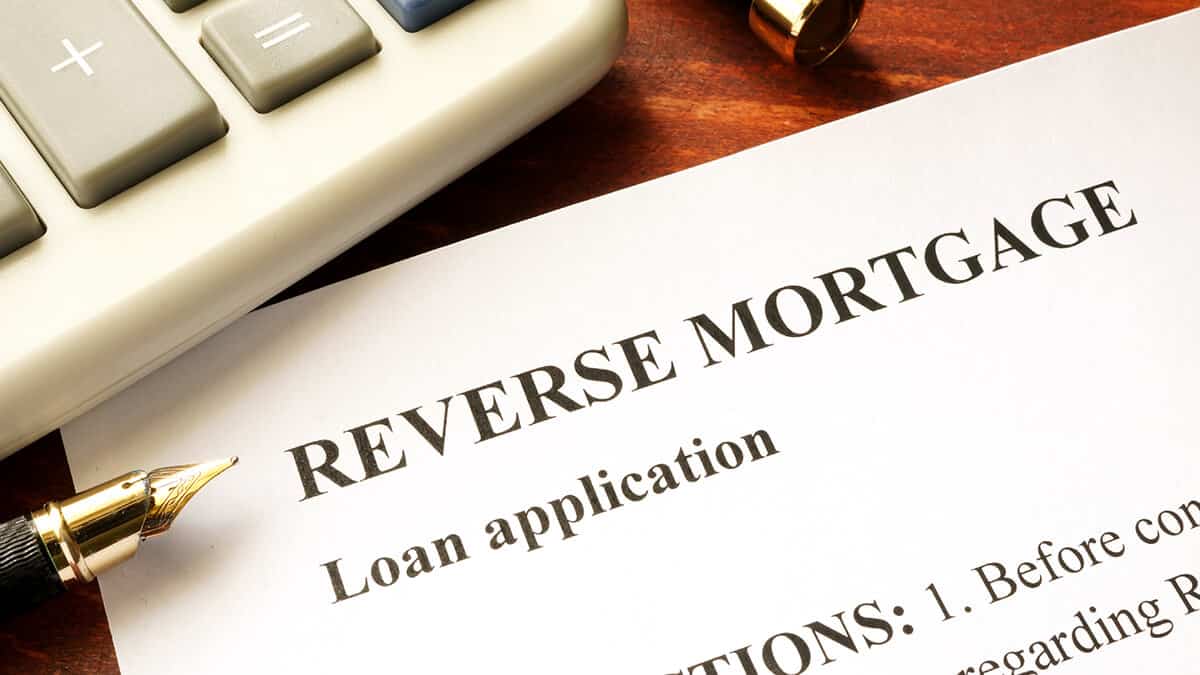In this guide
With cost-of-living pressures still an issue, many Australians are finding it difficult to make ends meet and it can be even tougher if you’re retired.
While you may own a home that’s soared in value over the years, your retirement income is unlikely to have kept pace with rising household bills.
If you find yourself asset rich but income poor, one solution can be to unlock some of the money tied up in your home through a reverse mortgage. These financial products work a bit like a traditional home loan – but in reverse.
It’s a strategy being used by growing numbers of people over age 60 to top up their income from super and the Age Pension in retirement, or to pay for lumpy expenses like holidays or a new car.
What are reverse mortgages?
A reverse mortgage allows you to borrow money against the equity you have built up in your home, that is, the value of your home less any mortgage debt.
There is a range of products in this area and each is slightly different. Aside from traditional reverse mortgages, there are also newer products such as reverse equity release and home reversion arrangements.
If you are thinking about using one of these products, it’s important to understand how it works and compare it to other products on offer in this area.
How do they work?
With a reverse mortgage, interest is charged just like a normal home loan, but you don’t have to make regular repayments. Instead, the interest charged on your loan amount compounds over the years and is added to the initial loan amount.
Borrowers can repay their loan in full – or in part – at any time, generally without any penalty.
With a reverse mortgage, you retain ownership of your home and can remain there for as long as you wish. You are also free to sell your home and repay your loan at any time. Alternatively, the loan will be repaid out of your estate after your death.
Generally, reverse mortgages are only available to borrowers aged 60 and over, with the money from your loan drawn down as a lump sum, regular income stream or line of credit.
The maximum amount of equity you can withdraw varies between providers. The current maximum at age 60 is around 15–20% of the property’s value. This is to ensure you retain adequate equity in your property over the term of the loan.
This amount generally increases by 1% for every year in age so, at age 65, you could withdraw a maximum of 20–25% of your home’s value, up to a maximum of 35%.
The minimum loan amount also varies, but most lenders are unlikely to offer a loan for less than $10,000, although the minimum can be much higher. The amount of your loan will also be affected by your age, with higher amounts available as you get older.
What are my loan options?
Most reverse mortgage lenders offer flexibility in their products and how you choose to draw down on them.
You can choose to make multiple regular or irregular drawdowns, take a single lump sum or choose a combination of drawdowns and lump sum.
You can use your loan for a variety of purposes or strategies, including boosting your regular retirement income or taking a lump sum for a particular purpose (such as paying for a family wedding, holiday, home maintenance or modifications to help borrowers age in place, or an aged care deposit).
Some lenders also allow you to tap into the equity in your investment property or holiday home or even refinance your existing mortgage into a reverse mortgage.
Lenders offering reverse mortgage-style products
Currently there are less than a dozen specialist lenders offering reverse mortgage-style products, with none of the big four banks offering them. The main lenders in the market listed on the ASIC Reverse Mortgage Calculator are:
Important: These are not recommendations or endorsements for any of these providers
| Specialist lender | Product options | Lender loan limit | Loan-to-value ratio (LVR) |
|---|---|---|---|
| ASAG | Standard Reverse Mortgage | No limit | 15% |
| Express | Reverse Mortgage | $50,000 | 12.5% |
| G&C Mutual Bank | Retirees Access Loan (Reverse Mortgage) | $200,000 | 15% |
| Gateway Bank | Reverse Mortgage Access | $1,000,000 | 20% |
| Gateway Bank | Reverse Mortgage Lump Sum | $1,000,000 | 20% |
| Heartland Bank Australia | Standard Reverse Mortgage | No limit | 15% |
| Aged Care (5-year term) | No limit | 20% | |
| Secondary Property | No limit | 15% | |
| Household Capital | Household Loan | $5,000,000 | 20% |
| IMB Bank | Aged Care Loan (3-year term) | $2,000,000 | 25% |
| Aged Care Loan (5-year term) | $2,000,000 | 25% | |
| Reverse Mortgage | $2,000,000 | 14% | |
| Inviva | Equity Advantage (5-year term) | $2,000,000 | 15% |
| Equity Empower – Standard Reverse Mortgage | $2,000,000 | 15% | |
| P&N Bank | Easy Living Loan – Metro | $300,000 | 20% |
| Easy Living Loan – Non-Metro | $300,000 | 10% |
Information current as at January 2026. Loan providers and details sourced from ASIC Reverse Mortgage Calculator.
Reverse mortgage lenders offer a variety of products suited to borrowers with different requirements (such as aged care payments or those needing a small lump sum).
Some products also specify a minimum home value. For example, Express has a minimum property value of $400,000, Household Capital $600,000 and Inviva $750,000 on its Equity Advantage product.
As with traditional home mortgages, the interest rates, fees, repayment requirements and LVR for a reverse mortgage vary depending on the lender and product, so it’s worth shopping around.
Current interest rates for reverse mortgages vary significantly, starting from around 8.35% (as of January 2026), depending on the individual product, so make sure you do your homework before signing up.
Reverse mortgages: Pros and cons
Like most financial products, there are both benefits and drawbacks to a reverse mortgage:
Pros
- Regular repayments are not required
- Repayment of the loan comes when the home is sold, or from your estate
- You benefit from any increase in the property’s value
- Interest is calculated on the outstanding loan balance and is added to the loan balance each month
- Voluntary repayments can be made at any time
- Interest rates are usually lower than personal loans or credit cards
- Interest rates are generally variable
- Avoids the need to downsize or move away from family and friends
- Some lenders allow you to borrow against a holiday home or investment property.
Cons
- Interest rates are generally higher than for regular mortgages
- Interest rates are currently more than double the federal government’s Home Equity Access Scheme
- Interest rates are generally variable rather than fixed
- Compounding interest makes the loan balance increase quickly
- Additional charges can include establishment fees, monthly/annual fees, switching fees and discharge fees
- Reduces the capital available for future costs like home improvements or medical expenses
- Limits the capital available for a residential aged care deposit
- Reduces the size of your estate remaining for your family and your other beneficiaries
- Leaves less equity compared with downsizing to a smaller, cheaper home
- Some reverse mortgage lenders require you to obtain their permission before selling, leasing, vacating or renovating your property
- A non-title-holding resident may have to move out when the loan becomes repayable on your death.
Case study results sourced using the ASIC Moneysmart Reverse mortgage calculator and current market interest rates as at January 2026.
Rules protecting reverse mortgage borrowers
Since September 2012, all new reverse mortgage contracts must include a protection guarantee to ensure you cannot end up owing your lender more than the value of your home when it’s eventually sold.
This guarantee protects you from going into negative equity (when the value of your home is less than the outstanding balance on your loan). It doesn’t stop much of the equity you have accrued in your home from being eroded by the compounding interest charged on your loan if interest rates rise or you extend the loan.
To avoid eroding all the equity in your home, some reverse mortgage products allow you to protect a portion of your equity for your estate (usually called protected equity). If you do this, the amount you will be able to borrow is usually smaller.
ASIC requires reverse mortgage lenders to provide loan applicants with a printed projection showing how their home equity will decrease over time and the impact of different interest rates on a reverse mortgage loan with a variable interest rate.
Impact of a reverse mortgage on your Age Pension
Taking out a reverse mortgage does not generally make you ineligible for the Age Pension, but you need to be careful, as Centrelink does impose conditions on any payments:
Income test
Generally, the amount drawn down under a reverse mortgage is not counted as income by Centrelink. But if it is invested, it will then be deemed or counted as income.
Assets test
Generally, the first $40,000 of a lump sum withdrawal from a reverse mortgage is exempt from the assets test for 90 days. If the money is not spent within the time limit, it will be counted as an asset. Different rules apply depending on whether the money is spent on assessable assets, maintenance or improvements to your home, or gifted to another person or family.


Leave a Reply
You must be logged in to post a comment.